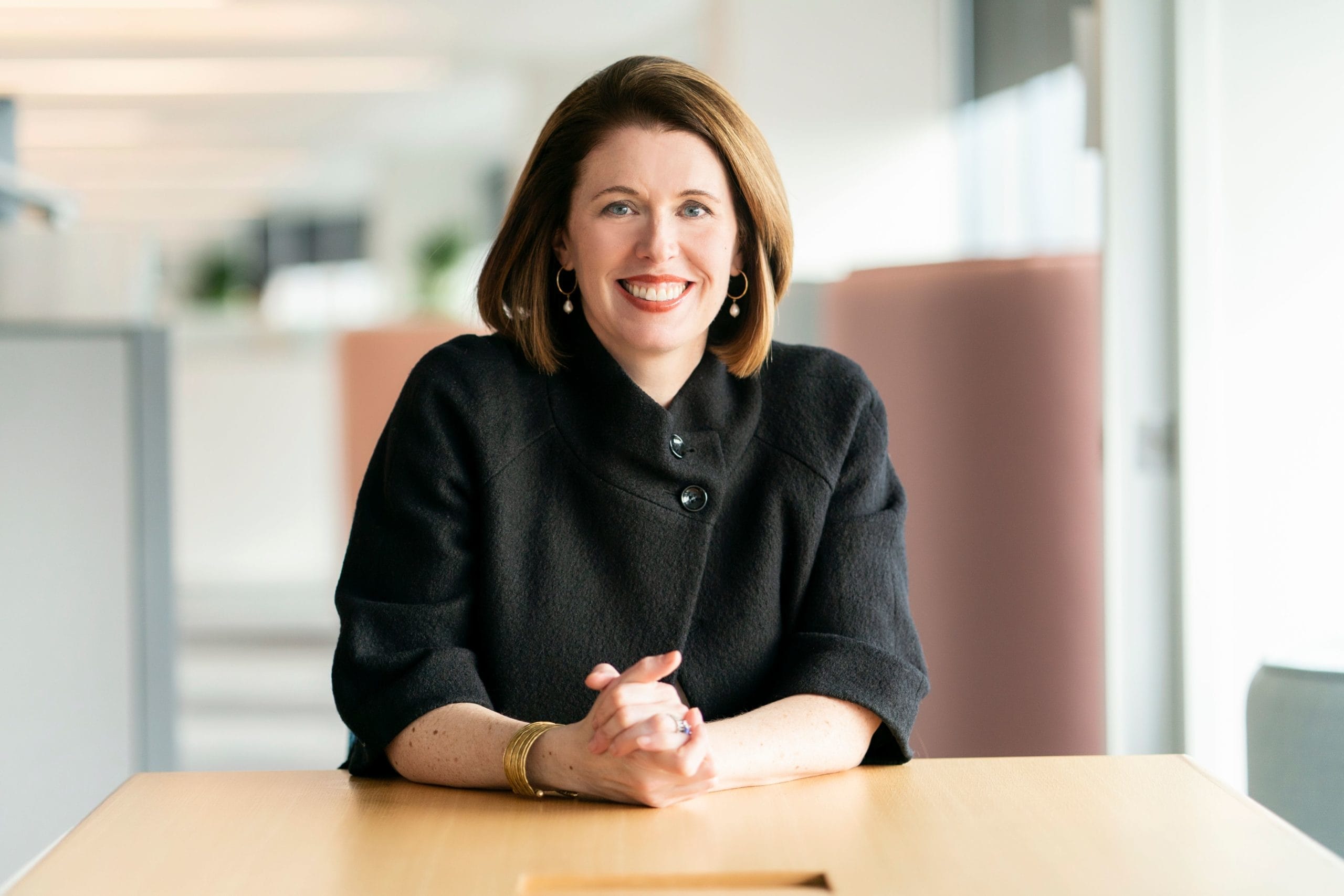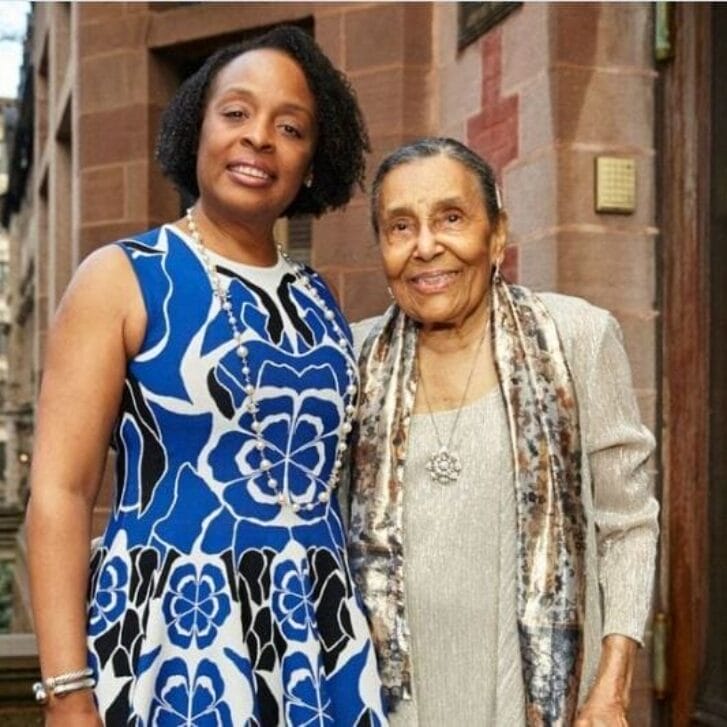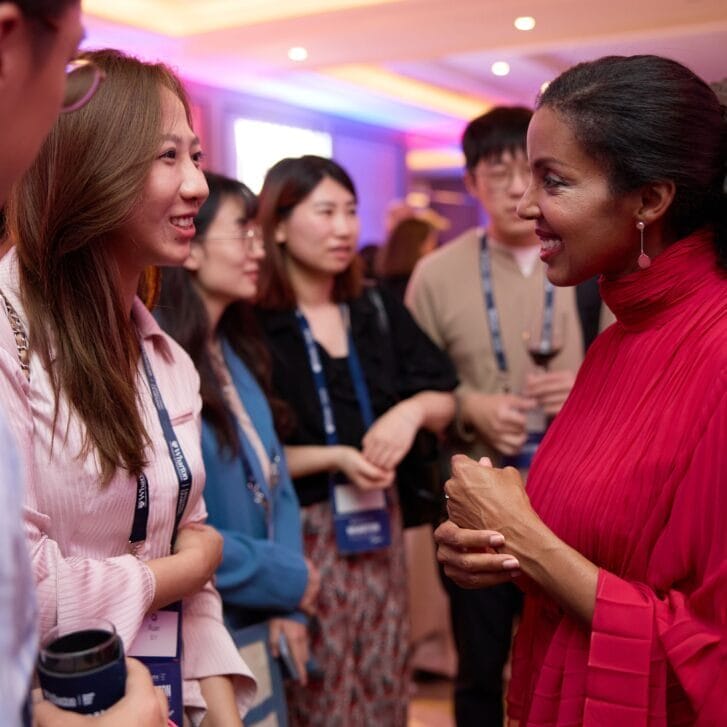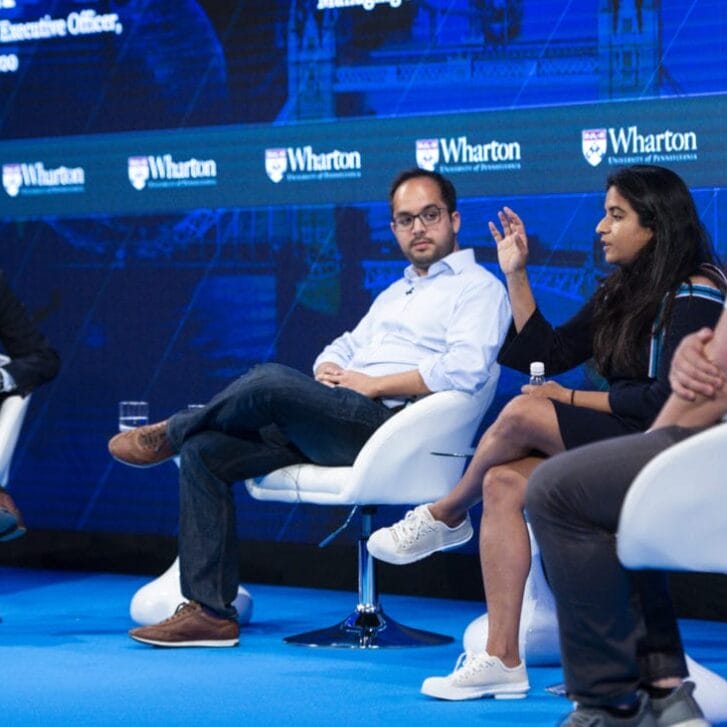The lifecycle of every Wharton alum has at least three stages—applicant, student, graduate. Shannon Connelly, Wharton’s new Executive Director of Alumni Relations, has expertise in each area. Before Connelly took on the role with Wharton External Affairs in January, she led teams in Wharton MBA Admissions, Career Management, and Penn Abroad. As the School increasingly seeks to plant the seeds of a lifelong relationship as soon as students set foot on campus (and even before), Connelly’s insight into the student experience will inform how the lifecycle of a Whartonite evolves. We sat down with her to discuss her unique perspective on the alumni network, her most awe-inspiring Wharton moment, and why this is a great time to reconnect with the School.
Wharton Magazine: How would you describe Wharton alumni? What traits do they have in common?
Shannon Connelly: The adjectives that come to mind are global, expansive, always learning, and passionate about their alma mater.
WM: How did your previous roles at Wharton shape your understanding of students and alumni?
SC: Having a strong understanding of the student mindset is going to be helpful in serving the needs of the alumni community. I learned to appreciate what’s important to students: How do they prioritize recruiting and other aspirations? What areas of interest or industries become appealing to them? How might their career plans evolve during their time at Wharton? Having that insight into what appeals to Wharton applicants and students has allowed me to better understand alumni expectations and ways they want to show support.
WM: What are those expectations?
SC: The majority of them want to maintain active relationships with Wharton; they recognize how much of an opportunity Wharton was for them. There is a strong mindset of wanting to give back to the institution as much as possible. One thing that is nearly universal is how grateful and supportive graduating students are. It’s pretty terrific seeing the level of enthusiasm that people leave here with, and how they continue with that enthusiasm for many, many years.
WM: How does that decision to invest in a Wharton education bring returns over the years?
SC: The large size of Wharton’s global alumni network is appealing to applicants—the scope and the strength of our network is inspiring. Wharton’s MBA and undergraduate classes allow students and alumni to meet people from different backgrounds—work experience, areas of interest, ethnicities, and geographic locations. Students and alumni really value that. We have a large faculty as well, more than 240 scholars who are ready to partner with students in a variety of ways.
WM: Wharton has changed a lot in the past 10 years or so. For alumni who are a decade out or more and are not necessarily very connected, what should they know?
SC: Alumni engagement is part of a lifelong journey. That ongoing relationship varies during different periods of life. Their needs and expectations will change, but it’s never too late to come back. We are ready and willing to meet alumni where they are.
Whether it’s attending an event in person, getting active with the local alumni club, or participating in on-demand programming, we have such a breadth of offerings for the alumni community. The key part is making sure people know about it. And once people begin to engage with us, I think they will be pleasantly surprised and look to learn more about what Wharton is doing.
Also, alums who graduated a while back are always delighted when they return to campus and see firsthand the physical transformations. The campus has certainly grown up, grown out, and grown more beautiful in many ways. It’s a treat to watch alums discover these changes when they return to campus each May for Reunion.
WM: You worked at JP Morgan before you entered higher education. How did that prepare you for what you’re doing now?
SC: I was there during the merger of JP Morgan and Chase Manhattan. While it was a hard time for colleagues, it taught me a lot. I learned how expansive a bank can be, how different divisions work, what skills are important to excel in different functions. I also saw how a strong brand can unite people around the world. It may not be coincidental that after I left finance and pivoted into higher education that I wound up at “the finance school.”
WM: Say I’m an alum and I haven’t been very engaged at all. Why should I reconnect, and how?
SC: When people are wrestling with an issue at work, we have resources that can help, like on-demand webinars. When you go through a challenging time in your career, we have complimentary career coaching and industry-focused affinity networks. When you look to benchmark on compensation data, we have industry-specific figures that we can share. When your company has a hiring need, we can help you hire both student and alumni talent. These are all high-quality resources that Wharton alumni can find in one place.
Alumni can also help strengthen the Wharton community by talking about the school. Spread the word about Wharton. Talk it up to your professional and personal network. Explain to someone considering business school how Wharton was a transformative experience. Chat with your colleagues who may or may not know that you are a Wharton graduate. Get involved with your local alumni club by bringing your professional skills to enhance their programming and reach. Everyone will take a different approach to promoting Wharton, but in a global network of almost 100,000 alumni, I know those individualized approaches will add up to something greater than their parts.
WM: Wharton has events all over the world. How does attending these events enhance the alumni experience?
SC: Our events are a great way for people to stay informed about what areas Wharton is focused on, about what the current student community is interested in, and ways that faculty research has been evolving. Our Global Forums are an example of this knowledge sharing—at these conferences, you can meet top-notch faculty and connect with fellow alumni, who have inevitably had their own fascinating career paths. You can experience how talented, smart, and humble so many of these graduates are. You won’t find that kind of opportunity anywhere else.
WM: What do you want to accomplish in the next year?
SC: I would like the alumni relations team to deepen the relationship of every single alumnus in the world. With some people, that connection may already be strong, and with others, we’ve just barely scratched the surface. But I would like to move the needle somehow with each person’s relationship with the school.
WM: Anything personal you want to share?
SC: I’m a happily married, proud mom of two sons. I’m also a perpetual student. That’s part of why I like working in higher education and why I suspect I will always work in higher education. I like being surrounded by people who value learning as much as I do.
I do pretty well with foreign languages. I can say “thank you” in a surprising number of languages. It is my life goal to be fluent in five languages; I’m probably at two and a half so far. My Spanish is good, and my Italian is not terrible. I’ve also studied French and Portuguese.
WM: Do you travel a lot to immerse yourself in different languages?
SC: I have traveled a bit. It’s another life goal—I want to make it to all 50 states and all seven continents. I’m at 38 states and five continents, but I have visited Antarctica, so I’m getting there!
WM: We’ve been asking people to share their More Than Ever Moments—a story about when you realized the power of Wharton’s impact. What is yours?
SC: When I worked in MBA Admissions, there was nothing more awe-inspiring than listening to an alumnus speak with an admitted student who was still unsure about accepting Wharton’s offer of admission. Hearing an alum articulate how Wharton changed his or her life—it was impossible to listen and not feel proud as a result. I still feel that way.

























